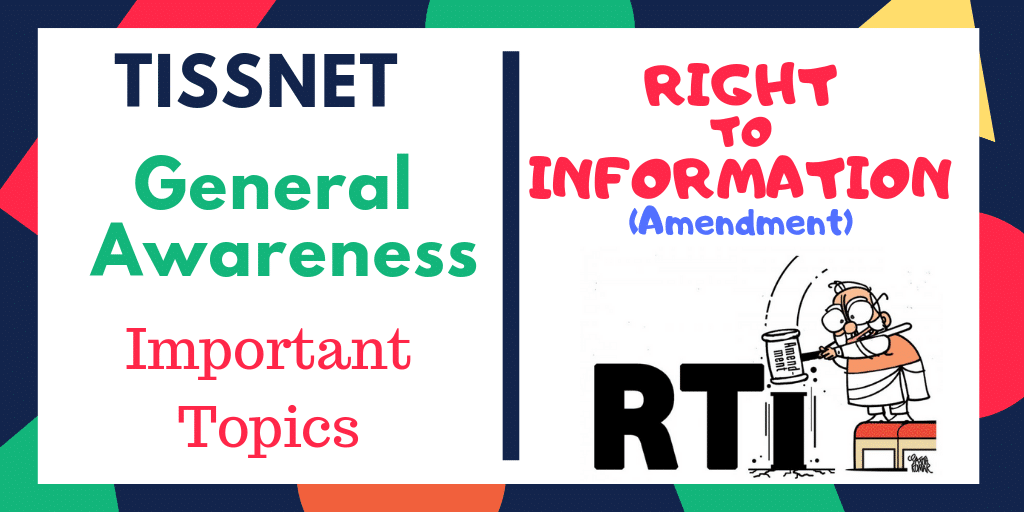Important Bills and Acts are very important for TISSNET GA. Let’s know everything about the RTI and its amendment in detail.
Overview of this blog:
- What is RTI-Right to Information
- Why RTI is necessary
- RTI Act, 2005
- To whom it is applicable
- Salient Features of RTI Act, 2005
- RTI Amendment Bill 2019
- Amendments in RTI Amendment Bill 2019
- Serious concerns – RTI amendment Bill 2019
- RTI Performance – Over the Years
- Makes administration more accountable to people & reduces the gap between administration and people.
- Facilitates constructive criticism of the government.
- Increases people participation in Administration.
- Promotes the public interest by discouraging arbitrariness in administrative decision-making.
- Upholds the democratic ideology by promoting openness and transparency in administration.
- Reduces the chances of abuse of authority by public servants.
- Right to Freedom of Speech & Expression (Article-19)
- Right to Life & Personal Liberty (Article-21)
- It is applicable to Government at all levels- Centre, State & Local (rural and urban)
- Bodies owned, controlled or substantially financed by government
- Non-governmental organisations receiving government grants.
- It covers the legislature, the judiciary, the executive and all constitutional bodies.
- It provides for the appointment of public information officer in each department to provide information on public request.
- It fixes a 30-day deadline for providing information & 48 hours if the information concerns the life or liberty of a person.
- Information will be free for people below the poverty line.
- Certain matters are not allowed to disclose like those related to sovereignty & integrity of India, security, the scientific or economic interest of the country and so on.
- There is a bar on the jurisdiction of courts. No court can entertain any suit, application or other proceedings in respect of any order made under the Act.
- It provides for the establishment of Central Information Commission (CIC) & State information Commission (SIC) to implement the provisions of the Act.
- The Act provides for a system of two appeals in case the information is denied:- 1.) Appeal to the senior or concerned public information officer within 30 days 2.) Appeal to the Information Commission within 90 days. The decision of the Information Commission is binding. The appeal at both stages must be disposed of within 30 days which is extendable by 15 days if necessary but in any case, the decision must be given within 45 days.
- CIC is higher-powered independent bodies to act as appellate authorities & vested with the powers of a civil court.
- CIC will entertain complaints and appeals in case of offices, financial, public sector undertakings etc. under the Central government & Union Territories
- The President will appoint Chief Information Commissioner. Their term will be of five years.
- Chief Information Commissioner will publish an annual report on the implementation of Act. These reports will be tabled before Parliament.
- SIC is a higher-powered independent body to act as appellate authorities & vested with the powers of a civil court.
- SIC will entertain complaints and appeals in case of offices, financial, public sector undertakings etc. under the control of state government
- Governor of States will appoint State election commissioners. Their term will be of five years.
- State Information Commissioner will publish an annual report on the implementation of Act. These reports will be tabled before the state legislature.
- The amendment does away with the fixed tenure of five years for the Chief Information Commissioner (CIC), Information Commissioner (IC), and State Chief Information Commissioner (SCIC) & State Information Commissioner (SIC). As per Current Act, it states that no CIC, IC, SCIC or SIC can serve more than one term, which is for a maximum period of 5 years or till the age of 65, whichever is earlier. For ICs and SICs, if one of them is nominated to the post of CIC or SCIC, his/her total tenure as both IC and CIC or SIC and SCIC cannot exceed 5 years.
- Another amendment has done away with the fixed salary for the CIC, IC, SCIC, SIC. The argument brought in for this “CIC body is not a constitutional body like EC. It is a statutory body. Therefore CIC or ICs cannot enjoy the status and salary as EC or Supreme Court does.”
- Another Amendment has done away with the appointments made by the President & Governor based on the recommendation of a committee consisting of PM as chairperson, Leader of Opposition & Cabinet minister nominated by PM at the Central Level and CM as chairperson, Leader of opposition in Legislative assembly and state cabinet minister nominated by CM at the state level

